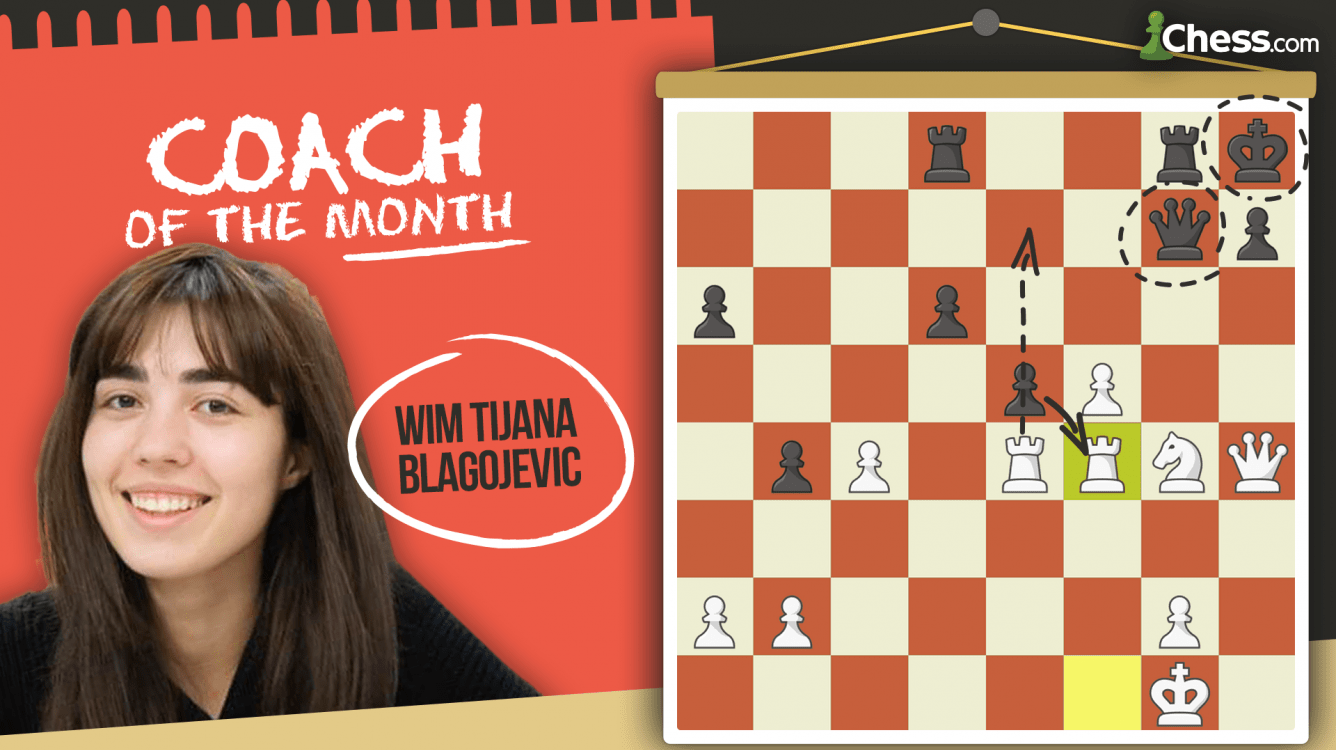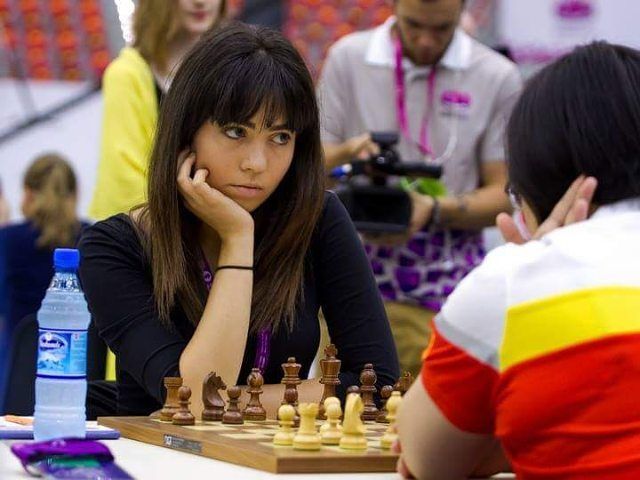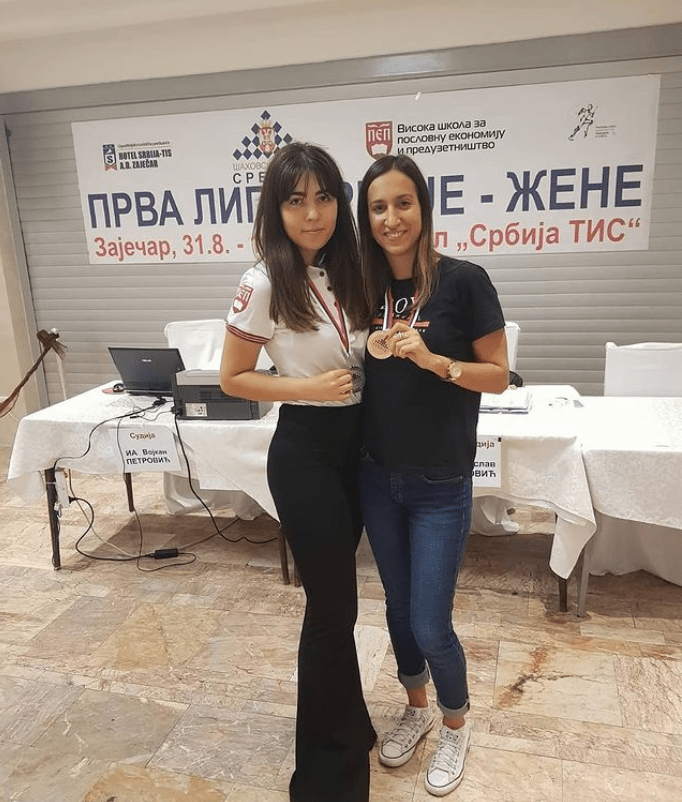
Coach of the Month: WIM Tijana Blagojevic
Chess.com's February Coach of the Month is WIM Tijana Blagojevic! She is a top-10 female player in Serbia, a Chess.com Top Blogger, and an excellent coach!
She was a bronze medalist at the World Under-18 and European Under-18 Championships in 2015, earning her WIM title in the process. Tijana now runs the chess training site Chess-Boost.com.
Readers seeking private instruction can contact Tijana Blagojevic via her Chess.com profile and can find other skilled coaches at Chess.com/coaches.
At what age were you introduced to chess, and who introduced you?
I was born into a chess family: My dad Dragisa is a grandmaster (editor's note: and six-time national champion!) and my mom Lidija is a woman FIDE master, so I've been playing chess since I was 5.

What is your first vivid memory from chess?
My first vivid memory is also an instructive one. One of the first tournaments I played in was an under-20 championship in Montenegro. I was among the youngest participants and at the time was an unrated player. In the first round of the tournament, I played against a top-rated opponent and a multiple-time champion who was almost 10 years older than me. I didn’t really know much about theory or openings at the time, but I played very well and ended up in a winning position. We played without an increment, and my opponent was very low on time. Being inexperienced, I decided to play quickly in order to flag her instead of focusing on playing well!
Needless to say, I blundered several times, and she managed to checkmate me with one last second on the clock. I started crying immediately, and my dad tried to console me by telling me that losses are part of the game, but I replied: “I’m not crying because I lost, I’m crying because I cannot win the tournament now!” He started laughing and told me: “You’re going to win next year"—which ended up coming true!
Which coaches were helpful to you in your chess career, and what was the most useful knowledge they imparted to you?
I have had many coaches during my career, but I’d like to highlight two of them. The first and probably most important was my father, GM Dragisa Blagojevic. Dad introduced me to chess and also taught me all of the basic strategies and endgames. For the last several years, I’ve been working with IM Zoran Arsovic on various aspects of the game. Zoran is an excellent coach with a huge influence on my play and opening repertoire.

Both Dragisa and Zoran showed me the importance of classic games and how to apply that knowledge and flair in my own games. An engine can tell you the best move, but it cannot really tell you why it is the best move!
Which game do you consider your "Magnus Opus"?
Playing for IM and WGM norms at the Petrovac Open, in round six I was paired against GM Nebojsa Nikcevic. Winning this game was crucial in order for me to play against a strong opponent in the next round and have a chance of attaining the norms.
This was my best performance in any tournament so far. I scored 2.5/5 against GMs and 2/3 against IMs, and earned my IM and WGM norms a full round before the end of the tournament!
How would you describe your approach to chess coaching?
I believe the most crucial aspect is that lessons are personalized. I always spend time before the lesson reviewing and analyzing my student’s games, trying to figure out their weaknesses and common mistakes, and organizing a lesson accordingly. I collect the material from different resources, like books and master games, that exemplify or clarify the topic we are working on.

Not only that, but I also try to make my lessons enjoyable and fun, because nobody learns well if they are bored!
What do you consider your responsibility as a coach and which responsibilities fall on your student?
I feel that my responsibility is to prepare for the lesson, collect the right material, present it in a clear way, and encourage students to ask questions. I always feel proud when my students manage to use the knowledge immediately after the lesson. That shows that my methods work and I enjoy that validation also. Seeing my student's progress is really important to me.
In order to get the most out of the lesson, students should go through the lesson material, as well as additional material I provide them with, and ask questions about anything that remains unclear. I am always happy to answer chess-related questions.

What is a piece of advice that you give your students that you think more chess players could benefit from?
Spend more time learning strategy. My students often ask me why they have a much higher rating in puzzles than rapid-rated games. The usual reason is the lack of strategical understanding of the game! In puzzles, you already have a "perfect" setup of the pieces, and you just need to find the final blow, while in your own games, you have to achieve this setup of the pieces yourself in order to enable tactics.
What is your favorite teaching game that users might not have seen?
There are many beautiful and instructive chess games that are fairly unknown to the chess community. However, I’ll choose one with a fun and personal story behind it.

My great friend Mila Zarkovic and I played the Sharjah Open in 2019. In the first round of the tournament, we were paired with much stronger opponents than us. I played against GM Yuriy Kryvoruchko (then rated 2680 Elo) and Mila played against, at the time not as famous, but very talented GM Alireza Firouzja (then 2657 Elo).
Right after the opening, I sacrificed a pawn for dynamic compensation and was very optimistic about my position. I went to check Mila’s game, and I was happy with what I saw; Mila was an exchange up and soon after a full rook up! I saw that Alireza had some compensation, but I believed that with precise play Mila should manage to win. Mila is a very solid player, both offensively and defensively, so I knew she was capable of holding the position even against a much higher-rated opponent!
Two hours later, both of us had lost! At first, we were suspicious about the validity of the rook sacrifice, but after analyzing it with the engine, it was clear that Alireza’s sacrifice was correct! Right there, we were sure that Alireza was going to be a great player one day! (Ed. note: Sure enough, two years later he became the youngest player ever to achieve a 2800 Elo rating.)
What is the puzzle you give students that tells you the most about how they think?
I love this position. There are many good moves in this position, making it a perfect puzzle to understand my student’s thought process and playing style.
Do you prefer to teach online or offline? What do you think is different about teaching online?
I find it easier to teach online, mostly due to the tools that are readily available. Lessons can be recorded, you can draw arrows on the board, it’s easy to save and share material, no need to travel, etc.
What do you consider the most valuable training tool that the internet provides?
I think Chess.com puzzles are extremely valuable. I use them for improving my own chess and recommend them to my students. Chess.com's analysis board is also very useful, as students can move the pieces at the same time as me, which makes communication much easier since they don’t have to be proficient with chess notation.

Additionally, I’d like to recommend chess-boost's positional puzzles.
Which under-appreciated chess book should every chess player read?
My System by Aron Nimzowitsch. Computers have invalidated some ideas presented in the book, but there is still so much value that can be extracted from the book about piece play, pawn structures, blockades, etc.
Prior Coaches of the Month:







